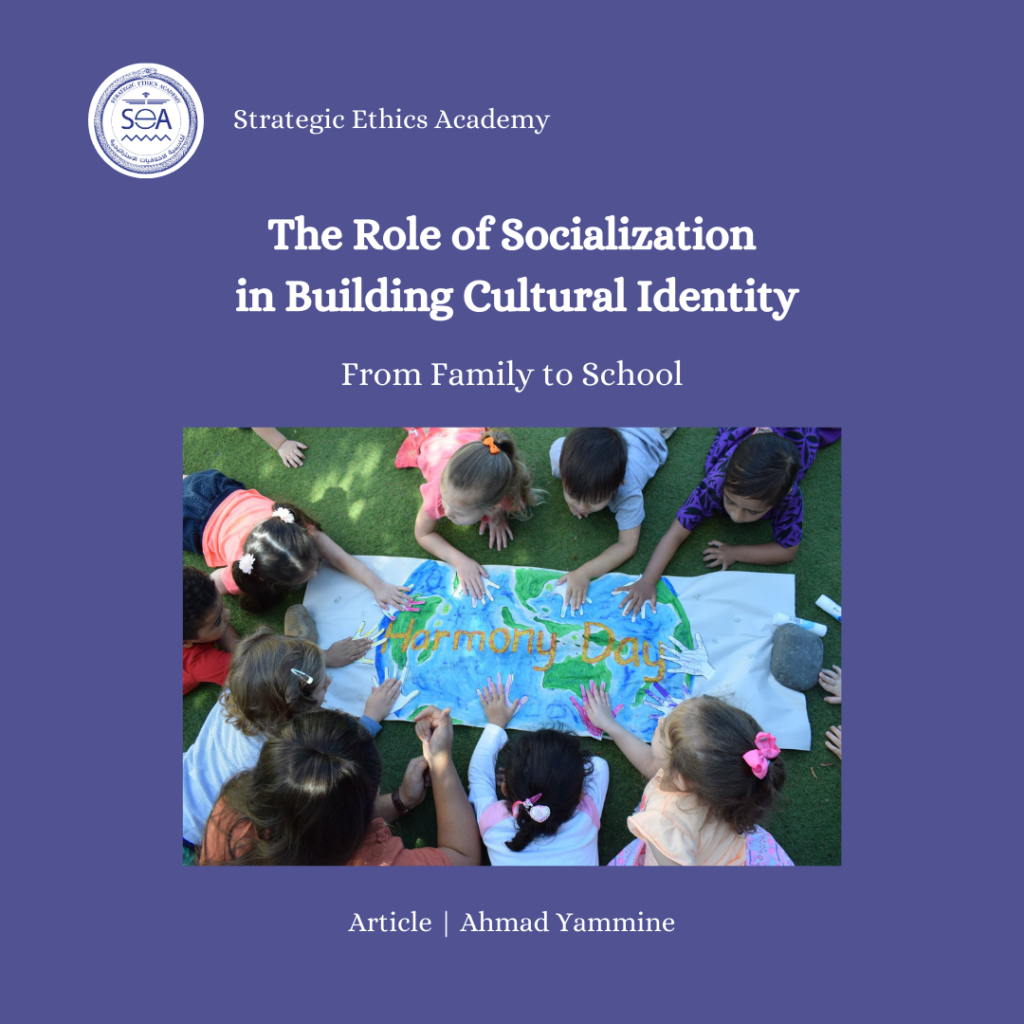
Article | Ahmad Yammine
Humans absorb the principles of their environment and society until their values and culture are ingrained in their subconscious. Through acquiring initial knowledge, a person gains culture, thought, identity, language, ideology, and often behavior patterns based on action and reaction. This acquisition is involuntary, directed by both direct and indirect socialization agents.
School, Our Second Home
If we were to identify some of these agents, we would find that the family is the first, as an individual acquires their initial identity and language within it during their early years. Later, the school assists in an extended formative phase, where the individual receives education through sciences, knowledge, teachers, friends, institutional character, and the administrative system that defines the school. This phase is crucial, akin to a tree in its growth stage: if we correct its bend early on, it will grow strong. If we fail, it will develop weak and deformed, beyond the help of later correction, like treating an illness posthumously.
The school is the longest-lasting and most influential socialization agent for an individual. Socialization continues in school parallel to the child’s mental growth, where they experience various relationships through identification with peers and sharing similar needs and desires, and relationships with adults, namely the subordinate-superior or ruler-ruled relationship, referred to as “authority.” Here, it is essential to delve into these two aspects in detail to understand the intention of the discussion and explore all possibilities.
For Stable Physical and Emotional Upbringing
When discussing identification with peers, we refer to the primary needs of a child, such as physical, psychological, and emotional needs, along with immediate and ever-renewing desires. To understand the issue of needs and desires, we can say that needs are fundamental requirements for life stability, such as food, drink, sleep, love, and care. They are essential and irreplaceable parts of life. Desires, on the other hand, are about living in comfort and luxury, enhancing life quality but are not essential. This comparison helps distinguish between needs and desires: the former are constant and irreplaceable, while the latter are temporary and replaceable. For instance, the human body needs food and drink to maintain energy, which does not have to come from foreign dishes or fast food but from what nourishes and energizes the body. Love and care are necessary to satisfy a child’s emotional needs and color their psychological sphere, whether love is expressed through words, actions, or possessions. A child in school will feel deprived if not given a chance to nourish their body, weakening their productivity due to unmet primary needs. However, they will not feel deprived if sweets and candies are absent. Similarly, they will not feel deprived if a peer does not lend them a pen or an eraser but will if rejected, despised, or ostracized. Here, we observe the priorities that must be considered for stable physical and emotional upbringing.
Regarding relationships with adults, they often involve an age gap and a desire for authority without wisdom. Few recognize this and try to bridge the gap. This manifests in adults viewing the needs of the young from their age perspective or not seeing them at all due to having experienced similar situations. Humans often project their experiences onto their surroundings unconsciously. Thus, assigning tasks without proper recognition is discouraging and limits a child’s self-esteem, hindering their productivity and creativity. Lack of encouragement equates to a lack of attention, as humans need motivation to act, either internally – which children cannot self-activate – or externally – which is what children need most from their caretakers. Hence, we must not underestimate the impact of words on the recipient and their effect. Motivation does not necessarily have to be material; it can be moral. Many children say they succeeded because their parents believed in them, and many adults endure work challenges for the joy or approval of loved ones, often unconsciously. Humans are driven by both material and moral incentives. Without such motivation, creativity would vanish, success and failure would be indistinguishable, and humanity would stagnate.
Together Towards Proper Upbringing
Considering these relationships, we can assert that humans, as social beings surrounded by forces of attraction or repulsion, will not reach their ultimate goal unless surrounded by factors of attraction. Consequently, they remain isolated individuals, battling themselves due to many unmet primary needs and struggling with others due to lack of appreciation and declining desire to participate in the collective. Lack of sufficient awareness creates a conflicting, regressive environment fertile for backwardness in its various forms and reflections, where individuals inherit repulsion on the principle: “One cannot give what they do not have.” Discussing the school as the most impactful socialization agent, it embodies and influences all the aforementioned aspects.
Therefore, it is crucial to develop an educational environment that nurtures rather than just teaches. The primary goal of socialization is to achieve adaptation and integration, blending the individual with the collective to fulfill both. To achieve this, we must understand the human being as composed of body and soul, whose needs must be scientifically and practically satisfied and stimulated, avoiding randomness and subjectivity. We must identify the flaws of our predecessors in us to prevent them from extending to our successors, so society does not die with its living members, becoming a burden on its progress.
Ahmed Yammine
Teacher and Trainer
Specialist in Distance Learning Strategies
Master’s Degree in Arabic Language and Literature
